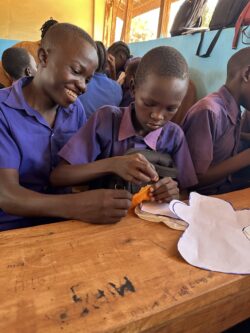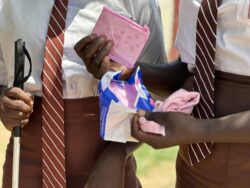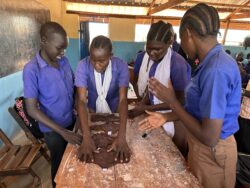Make Menstrual Hygiene Management decent for all girls and women, including those with disabilities
May 28, 2023 12:36 pm“There was a very nice lady at the eye clinic. She is the one who showed me how to use sanitary pads first. I was 12 and had never been told how to use sanitary products, even my mum did not tell me,” Dalia, learner with visual impairment, Juba.
Today is Menstrual Hygiene Day! A day to highlight the importance of good menstrual hygiene management globally. This year, we join the world in the celebration under the theme ‘We Are Committed,’ this is a call to everybody to be committed to realise the move of collectively creating a world where periods are considered a normal fact by 2030.
Unfortunately, despite years of work to promote menstrual hygiene as a normal and natural process, there are still biases in some communities. It is considered unclean by many people in South Sudan, and anybody experiencing menstruation is considered ‘dirty.’

Access to hygienic and affordable menstrual hygiene products and gender segregated toilets continue to be major barriers to education for girls and women in resource-poor countries. “At the school, there is no special facility for me to use. I use the same with the other students,” Winnie, a learner with a disability in Wau.
South Sudan is a low-income country, with remarkably elevated levels of illiteracy and numerous existing biases against menstruation. There are different (and often false) understandings about menstruation from one community to another, with diverse ways of managing menstrual hygiene which continue to affect girls and women.
For some girls and women in South Sudan, having your period means sitting on a hole throughout the duration, and staying away from members of the community. Many in urban areas still face challenges in managing their menstrual hygiene due to poor facilities. The barriers are compounded for girls and women with disabilities, who often do not have access to disability-friendly facilities.
 Dalia, a student with a visual impairment in Juba shares the experience of her first menstrual cycle. “I was only 12 when my period came. Until then, nobody had ever told me what to expect and do. Nobody had even told me how to use the sanitary pads. When I got my first period, I was at home, and nobody helped me. The next day I went to school, and I continued feeling wet on my skirt. I even used a braille paper to sit on, until one good lady at the school helped me and showed me how to use the sanitary pads. We have pads at the school for such cases. I was lucky because the lady at the school helped me.”
Dalia, a student with a visual impairment in Juba shares the experience of her first menstrual cycle. “I was only 12 when my period came. Until then, nobody had ever told me what to expect and do. Nobody had even told me how to use the sanitary pads. When I got my first period, I was at home, and nobody helped me. The next day I went to school, and I continued feeling wet on my skirt. I even used a braille paper to sit on, until one good lady at the school helped me and showed me how to use the sanitary pads. We have pads at the school for such cases. I was lucky because the lady at the school helped me.”
Many girls like Dalia suffer from lack of menstrual hygiene products and disability friendly washing facilities, as well as poor education on menstrual health. “You see, nobody bothered to tell me about menstruation and how to use the pads. I needed someone to demonstrate for me because there is no way I can access other forms of information considering my condition (visual impairment)”
“Even my mum did not tell me, but with the help of friends, I can manage myself at school if I want to change, a friend will take me to the place for me to change (sanitary pads). My father is also supportive, he gives me money monthly he does not say what it is for, but I believe it is for buying pads,” Dalia added.

Through Girls’ Education South Sudan’s (GESS’) mentoring activities, the programme is supporting school children through the mentoring and book clubs to better understand good menstrual hygiene management and good hygiene practices, and how to make re-usable sanitary products. “We are doing this in the schools for both boys and girls to break the stereotypes around menstrual hygiene management (to end the belief) that boys cannot handle products. This is also to help the girls to be able to make alternative products in case they do not have money to purchase the single-use products. All the learners are happy to take part in the training,” Tereza, GESS Mentoring Assistant in Wau, Western Bahr el Ghazal State.
GESS believes that girls and women should never miss study time due to menstruation. The programme continues to support schools across South Sudan with capitation grants which are grants that can be used for school development. In many cases, schools have factored sanitary products into their budgets so that girls have access to sanitary products whenever they might need them. Schools purchase items like sanitary towels, extra uniforms, towels, basins and also improve the conditions of water, sanitation, and hygiene facilities in the schools to ensure both boys and girls have separate facilities for convenience.
We call upon all stakeholders to ensure girls have the support they need to improve menstrual hygiene management.
No girl, including those with disabilities, should miss on study time because of menstruation.
Every girl should attend school with dignity.
Categorised in: Human Interest Story
Comments are closed here.